Index relies entirely on the support of donors and readers to do its work.
Help us keep amplifying censored voices today.
The spring issue of Index magazine is special. We are celebrating 50 years of history and to such a milestone we’ve decided to look back at the thorny path that brought us here.
Editors from our five decades of life have accepted our invitation to think over their time at Index, while we’ve chosen pieces from important moments that truly tell our diverse and abundant trajectory.
Susan McKay has revisited an article about the contentious role of the BBC in Northern Ireland published in our first issue, and compares it to today’s reality.
Martin Bright does a brilliant job and reveals fascinating details on Index origin story, which you shouldn’t miss.
Index at 50, by Jemimah Steinfeld: How Index has lived up to Stephen Spender’s founding manifesto over five decades of the magazine.
The Index: Free expression around the world today: the inspiring voices, the people who have been imprisoned and the trends, legislation and technology which are causing concern.
“Special report: Index on Censorship at 50”][vc_column_text]Dissidents, spies and the lies that came in from the cold, by Martin Bright: The story of Index’s origins is caught up in the Cold War – and as exciting
Sound and fury at BBC ‘bias’, by Susan McKay: The way Northern Ireland is reported continues to divide, 50 years on.
How do you find 50 years of censorship, by Htein Lin: The distinguished artist from Myanmar paints a canvas exclusively for our anniversary.
Humpty Dumpty has maybe had the last word, by Sir Tom Stoppard: Identity politics has thrown up a new phenonemon, an intolerance between individuals.
The article that tore Turkey apart, by Kaya Genç: Elif Shafak and Ece Temulkuran reflect on an Index article that the nation.
Of course it’s not appropriate – it’s satire, by Natasha Joseph: The Dame Edna of South Africa on beating apartheid’s censors.
The staged suicided that haunts Brazil, by Guilherme Osinski: Vladimir Herzog was murdered in 1975. Years on his family await answers – and an apology.
Greece haunted by spectre of the past, by Tony Rigopoulos: Decades after the colonels, Greece’s media is under attack.
Ugandans still wait for life to turn sweet, by Issa Sikiti da Silva: Hopes were high after Idi Amin. Then came Museveni …People in Kampala talk about their
problems with the regime.
How much distance from Mao? By Rana Mitter: The Cultural Revolution ended; censorship did not.
Climate science is still being silenced, by Margaret Atwood: The acclaimed writer on the fiercest free speech battle of the day.
God’s gift to who? By Charlie Smith: A 2006 prediction that the internet would change China for the better has come to pass.
50 tech milestones of the past 50 years, by Mark Frary: Expert voices and a long-view of the innovations that changed the free speech landscape.
Censoring the net is not the answer, but… By Vint Cerf: One of the godfathers of the internet reflects on what went right and what went wrong.[/vc_column_text][vc_custom_heading text=”Five decades in review”][vc_column_text]An arresting start, by Michael Scammell: The first editor of Index recounts being detained in Moscow.
The clockwork show: Under the Greek colonels, being out of jail didn’t mean being free.
Two letters, by Kurt Vonnegut: His books were banned and burned.
Winning friends, making enemies, influencing people, by Philip Spender: Index found its stride in the 1980s. Governments took note.
The nurse and the poet, by Karel Kyncl: An English nurse and the first Czech ‘non-person’.
Tuning in to revolution, by Jane McIntosh: In revolutionary Latin America, radio set the rules.
‘Animal can’t dash me human rights’, by Fela Kuti: Why the king of Afrobeat scared Nigeria’s regime.
Why should music be censorable, by Yehudi Menuhin: The violinist laid down his own rules – about muzak.
The snake sheds its skin, by Judith Vidal-Hall: A post-USSR world order didn’t bring desired freedoms.
Close-up of death, by Slavenka Drakulic: We said ‘never again’ but didn’t live up to it in Bosnia. Instead we just filmed it.
Bosnia on my mind, by Salman Rushdie: Did the world look away because it was Muslims?
Laughing in Rwanda, by François Vinsot: After the genocide, laughter was the tonic.
The fatwa made publishers lose their nerve, by Jo Glanville: Long after the Rushdie aff air, Index’s editor felt the pinch.
Standing alone, by Anna Politkovskaya: Chechnya by the fearless journalist later murdered.
Fortress America, by Rubén Martínez: A report from the Mexican border in a post 9/11 USA.
Stripsearch, by Martin Rowson: The thing about the Human Rights Act …
Conspiracy of silence, by Al Weiwei: Saying the devastation of the Sichuan earthquake was partly manmade was not welcome.
To better days, by Rachael Jolley: The hope that kept the light burning during her editorship.
Plays, protests and the censor’s pencil, by Simon Callow: How Shakespeare fell foul of dictators and monarchs. Plus: Katherine E McClusky.
The enemies of those people, by Nina Khrushcheva: Khrushchev’s greatgranddaughter on growing up in the Soviet Union and her fears for the US press.
We’re not scared of these things, by Miriam Grace A Go: Trouble for Philippine
journalists.
Windows on the world, by Nazanin Zaghari-Ratcliffe and Golrokh Ebrahimi Iraee: Poems from Iran by two political prisoners.
Beijing’s fearless foe with God on his side, by Jimmy Lai: Letters from prison by the Hong Kong publisher and activist.
We should not be put up for sale, by Aishwarya Jagani: Two Muslim women in India on being ‘auctioned’ online.
Cartoon, by Ben Jennings: Liberty for who?
Amin’s awful story is much more than popcorn for the eyes, by Jemimah Steinfeld: Interview with the director of Flee, a film about an Afghan refugee’s flight and exile.
Women defy gunmen in fight for justice, by Témoris Grecko: Relatives of murdered Mexican journalist in brave campaign.
Chaos censorship, by John Sweeney: Putin’s war on truth, from the Ukraine frontline.
In defence of the unreasonable, by Ziyad Marar: The reasons behind the need
to be unreasonable.
We walk a very thin line when we report ‘us and them’, by Emily Couch: Reverting to stereotypes when reporting on non-Western countries merely aids dictators.
It’s time to put down the detached watchdog, by Fréderike Geerdink: Western newsrooms are failing to hold power to account.
A light in the dark, by Trevor Philips: Index’s Chair reflects on some of the magazine’s achievements.
Our work here is far from done, by Ruth Smeeth: Our CEO says Index will carry on fighting for the next 50 years.
In vodka veritas, by Nick Harkaway and Jemimah Steinfeld: The author talks about Anya’s Bible, his new story inspired by early Index and Moscow bars.
A ghost-written tale of love, by Ariel Dorfman and Jemimah Steinfeld: The novelist tells the editor of Index about his new short story, Mumtaz, which we publish.
‘Threats will not silence me’, by Bilal Ahmad Pandow and Madhosh Balhami: A Kashmiri poet talks about his 30 years of resistance.
A classic case of cancel culture, by Marc Nash: Remember Socrates’ downfall.
[vc_row][vc_column][vc_single_image image=”113272″ img_size=”full” alignment=”center” onclick=”custom_link” link=”https://www.indexoncensorship.org/indexawards20live/”][vc_column_text]A Russian artist currently under house arrest for her work on gender and sexual equality and one of the first free investigative journalism and fact-checking websites in Poland are among the winners of the 2020 Index on Censorship Freedom of Expression Awards. The winners, who were announced today on Twitter as part of a digital gala hosted by BBC presenter Timandra Harkness, also include a prominent lawyer fighting for the release of activists and journalists unlawfully detained in Turkey, a Bahraini activist living in exile in the UK and an Arab non-profit promoting digital rights of Palestinians.
Awards were presented in four categories: arts, campaigning, digital activism and journalism. The winners are: Russian artist Yulia Tsvetkova (arts); Turkish lawyer Veysel Ok and Bahraini activist Sayed Ahmed Alwadaei (campaigning); Arab Center for the Advancement of Social Media, also known as 7amleh (digital activism); and OKO Press (journalism).
Selected from hundreds of nominations from across the globe – a list of some of the most inspiring and courageous individuals and organisations operating today – the winners of the awards represent those who have had a significant impact fighting censorship. Now celebrating their twentieth year, previous recipients of the awards include activist Malala Yousafzai, Chinese author Ma Jian and journalists Anna Politkovskaya, Rafael Marques de Morais and Mimi Mefo.
“Today we acknowledge the winners of the Index 2020 awards as amazing people who do amazing things, while overcoming incredible challenges in difficult times. They fight for freedom of expression when others can’t,” said Rachael Jolley and Matt Townsend from Index on Censorship.
“This is the 20th year of the Index on Censorship awards, and we would also like to mark the winners of the previous ceremonies here today. It’s a highly unusual ceremony this year. We were forced to move online at the last minute, but it has meant that people from across the globe can join us today in noting the work that our winners 7amleh, Veysel Ok, Sayed Ahmed Alwadaei, Yulia Tsvetkova and OKO Press have done,” they added.
Each winner is now part of a year-long fellowship, which involves them working closely with Index who offer long-term, structured support. The goal is to help winners maximise their impact, broaden their support and ensure they can continue to excel at fighting censorship and free expression threats on the ground.
This year’s panel of judges included New York-based artist Molly Crabapple, award-winning Guardian journalist Amelia Gentleman and Cindy Gallop, founder of social sex video platform MakeLoveNotPorn. Speaking on the awards, Gallop said:
“I am in awe of all of the candidates we were asked to review for these awards and just blown away by what they are doing around the world. And I am thrilled that the Freedom of Expression Awards exist to celebrate that courage and those triumphs at a time when the need could not be greater.”
All of the winners spoke of how the awards had given them hope.
“It shows that our work has found support from the international community,” Ok said, while Nadim Nashif of 7amleh said the award would motivate them “to work more to advance digital rights and to achieve our vision of a safe, fair and free digital world”.
“The award pretty much reminds me that not everything is that bad. That there are still people who believe that [what I do] is important. For me, it changes pretty much everything. So thank you,” said Tsvetkova, who explained that over the last year she had received death threats and found it hard to focus on why what she was doing was important.
They also spoke about the greater challenges posed as a result of the coronavirus crisis. Alwadaei said:
“During the coronavirus crisis, I would like to pay tribute to those imprisoned in Bahrain for speaking out against the regime. This award is very special to me because my dear friend, Nabeel Rajab, was awarded this prize in 2012. Nabeel is currently serving 5 years in prison for criticising the government on Twitter.”
He added: “In these difficult times, it is more important than ever that freedom of speech is protected and that independent, critical voices are heard.”
But looking ahead OKO Press sounded a note of optimism:
“We believe the danger will wane, both epidemic and political. We will wake up in a healthier world.”[/vc_column_text][vc_single_image image=”113163″ img_size=”full” add_caption=”yes”][/vc_column][/vc_row][vc_row][vc_column][vc_column_text]Winning in the Arts category was Yulia Tsvetkova, a Russian artist and activist promoting women’s well-being and LGBTQ awareness. Her work has brought about positive change in discussions towards body positivity and gender stereotypes in Russia. But this acclaim has also made her a target. In 2018 she began a campaign promoting body positivity which resulted in her being named a suspect in a criminal pornography distribution case. Tsvetkova, currently under house arrest, could face up to six years in prison if convicted. In March 2019, her youth arts festival was cancelled after officials accused Tsvetkova of illegally trying to hold a gay pride event under the guise of a youth theatre festival.
The award for Campaigning went to two individuals. The first is Veysel Ok. Ok is a prominent Turkish lawyer providing pro-bono legal support to journalists, activists and academics who have been subjected to intimidation, surveillance, smear campaigns and harassment. His work has been instrumental in the release of several unlawfully detained journalists and writers. Ok is one of the first to challenge the Turkish laws of accreditation which determine whether a journalist meets official requirements to do their job. As part of his work, he received a five month suspended sentence for criticising the independence of the Turkish judiciary. He has been subject to surveillance and harassment ever since.
The second winner in the Campaigning category is Sayed Ahmed Alwadaei, a Bahraini activist currently living in exile in the UK. He was forced to flee Bahrain in 2011 after being arrested for taking part in anti-government protests. The Bahraini government revoked his citizenship and launched a smear campaign labelling him a terrorist. As the director of advocacy at the Bahrain Institute for Rights and Democracy, his work has become a vital resource for international media and NGOs. One such case was the discovery that institutions supported by UK taxpayers have been implicated in torture and other human rights abuses. Despite the danger faced by him and his family, Alwadaei continues his work as a prominent critic of the Bahraini government.
The Journalism award and Digital Activism award both went to organisations doing invaluable work in the digital sphere. One of the first free investigative journalism and fact-checking websites in Poland, OKO Press picked up the journalism award. OKO investigate and evaluate statements made by politicians, monitor public spending and fight for access to public information. In so doing they’ve paved the way for other news sources to follow suit. This has contributed to a safer and stronger public sphere, fighting for immunity from government propaganda.
Their work also supports grassroots activism; crucial in Poland, a country which is sliding further and further into authoritarianism and censorship. Indeed, the environment in which they work is becoming increasingly hostile. Political polarisation, lack of transparency, suspicion, threats and withholding of information are common. In the face of this, OKO Press shows resilience and determination. As they said in their acceptance speech:
“We are honoured to receive the award, but also humbled but the fact that other nominees, from Hong Kong, Venezuela and Burundi are acting in much harder circumstances. Friends, we admire your courage, determination and quality of work.
Kaczyński is no Maduro, Nkurunziza, Putin, or Erdogan, but apparently he takes his inspiration from them. We are not a dictatorship yet, though we are close to the so-called electoral authoritarianism, where all forms of public scrutiny, besides the elections, are being suppressed.”
Finally, the Digital Activism award went to the Arab Center for the Advancement of Social Media, or 7amleh as they’re known, a non-profit organisation focused on protecting the human rights of Palestinians in the online space. As Israel increases online monitoring, Palestinians are taking to social media to express disdain. 7amleh’s work protecting online safety and digital rights has been crucial. Through capacity building, research, advocacy and campaigning, 7amleh works to ensure that policies and companies are complying with human rights and are working towards greater accountability. Their campaign work with NGOs has seen huge numbers of participants. They’ve worked towards amendments in the Palestinian Authority’s Cybercrimes Law, the development of the first Arabic Digital Security Manual and digital training being implemented into the Palestinian education system.
If you believe in the work Index do please think about donating. For more information on how to donate click here.[/vc_column_text][/vc_column][/vc_row][vc_row][vc_column][/vc_column][/vc_row]
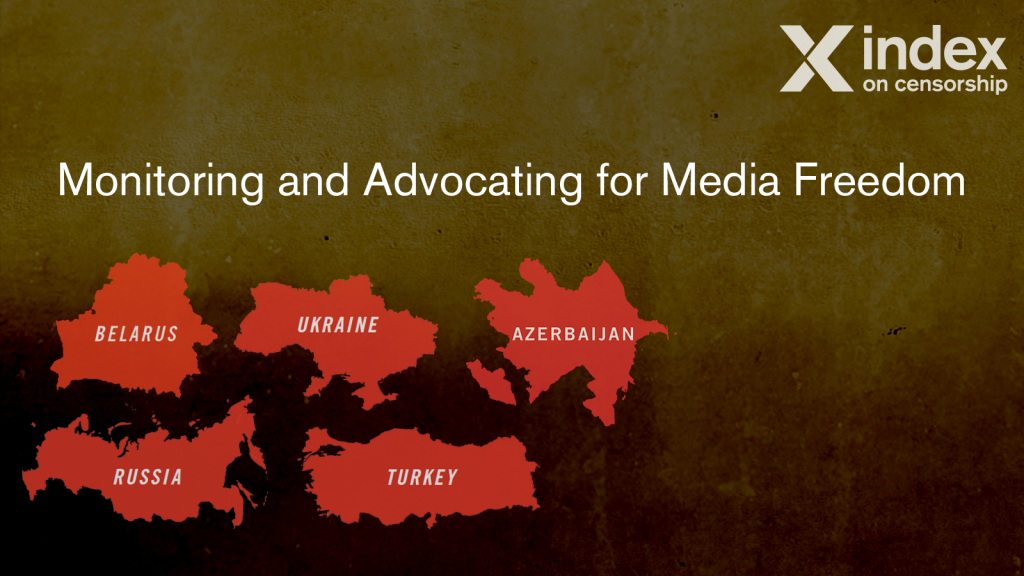
Index on Censorship’s Monitoring and Advocating for Media Freedom project monitors threats, limitations and violations related to media freedom in Azerbaijan, Belarus, Russia, Turkey and Ukraine. Previously these countries were also included in the Mapping Media Freedom project, which Index incubated and managed between 2014 – 2018.
This report summarises policy recommendations based on analysis since April, 2019. The recommendations are based on research by in-country correspondents and Index staff. Country reports published by the project since April are available on the project webpage.
After a brief background section, the report sets out key policy recommendations that apply to all the project countries, followed by key recommendations for each project country.
Background
It is essential that media freedom groups and international organisations continue to monitor, verify and document threats, limitations and violations related to media freedom in Azerbaijan, Belarus, Russia, Turkey and Ukraine, continue to raise awareness about the challenges and to advocate for change. Media freedom is severely restricted in all these countries and journalists are under great pressure.
Violence against journalists; misuse of counter-terror and security legislation to silence journalists; travel bans that isolate journalists and impact them professionally; failure to investigate violent crimes against journalists and silencing and punishing journalists through defamation and insult laws – all these are familiar tactics and increasingly common. In more recent years the introduction of restrictive internet-related legislation, such as in Russia, has opened a new frontline in the fight to safeguard media freedom.
RECOMMENDATIONS FOR ALL PROJECT COUNTRIES
Governments and multilateral groups, in particular the European Union (EU), must take a strong stand in defence of media freedom and journalists, both in their bilateral relations with the project countries and in multilateral processes. Governments and the EU should ensure that issues such as proposed or existing legislation that restricts media freedom, violence against journalists and failures to investigate crimes against journalists, form part of the agenda in strategic bilateral and multilateral discussions.
Countries that have a version of the Magnitsky Act (in the EU, this includes Estonia, Latvia, Lithuania and The Netherlands) should consider making use of this legislation in cases where media freedom and the safety of journalists are at stake. Countries that have not yet introduced such legislation should consider doing so. The UK should put its Magnitsky amendment into use.
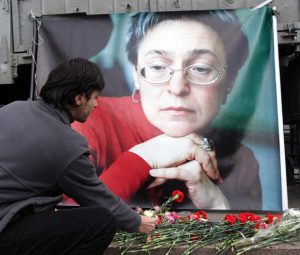
A man lays flowers near the picture of murdered journalist Anna Politkovskaya, during a rally in Moscow, Russia, 7 October 2009. CREDIT: EPA / Alamy Stock Photo
Impunity is a major challenge in all the project countries. In Azerbaijan, the death of freelance journalist Rafic Tagi, who died in hospital after a stabbing in 2011, has never been investigated properly. Belarussian cameraman Dzmitry Zavadski disappeared in 2000 on his way to meet journalist Pavel Sheremet, later killed in Ukraine in 2016. Zavadski’s body was never found.
The instigator of the 2006 contract killing of investigative journalist Anna Politkovskaya in Russia is still not known, nor is the motive. In 2018 the European Court of Human Rights found that the Russian authorities had failed to carry out an effective investigation into her killing. Turkey failed to investigate the death of editor Rohat Aktaş, killed when he was covering hostilities between Kurdish separatists and Turkish forces in 2016.
Ukrainan journalist Pavel Sheremet was killed by a car bomb in Kyiv in 2016 and, despite statements from the authorities that the case is a priority, there has been no progress. All the project countries should commit to investigating unsolved killings of journalists and should implement the guidelines in recommendation CM/Rec(2016)4 of the Committee of Ministers of the Council of Europe.
In relation to impunity, the guidelines envisage that when investigations and prosecutions have not resulted in justice member states can consider establishing special inquiries or independent specialised bodies, and that the latter could involve participation by respected media and/or civil society figures.
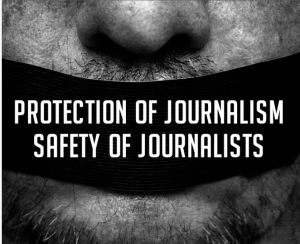 Council of Europe member states must engage fully with the platform for journalism
Council of Europe member states must engage fully with the platform for journalismCouncil of Europe member states must engage more actively with the Council of Europe’s Platform for the protection of journalism and safety of journalists. The partner organisations of the platform, which include Index on Censorship, should continue to use the platform to raise awareness of media freedom violations and threats to journalists. This should include advocating for states to respond to all alerts communicated to the platform.
The overall response rate from states in 2018 was only 39%. It is also important that states provide substantive replies to alerts and engage in follow-up dialogue with the partner organisations. The platform is an underused mechanism, with potential to achieve more. Partner organisations can also be of assistance to member states that are willing to engage fully.
Belarus is not a member of the Council of Europe, but other international organisations and processes, such as the special procedures of the United Nations human rights council, should be engaged to follow up cases and issues in Belarus.
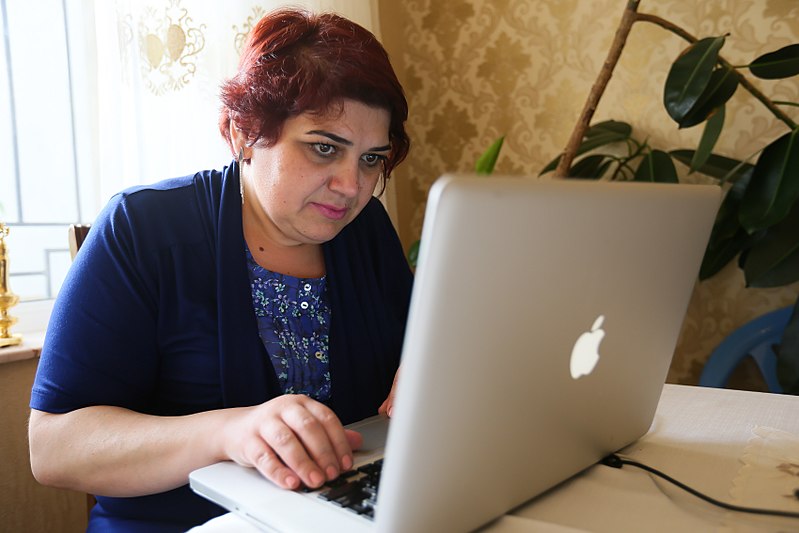
Azerbaijan must halt its use of travel bans for journalists including Khadija Ismayilova
The EU must use its influence to defend media freedom and journalists in Azerbaijan. Negotiations on an agreement to replace the EU-Azerbaijan Partnership and Cooperation Agreement, in place since 1999, are at an advanced stage and will need to be brought to a conclusion by the new European Commission. It is extremely important that the EU raises media freedom and human rights in these negotiations.
In 2018, the European Parliament adopted a resolution which recommended that the EU should make deepening of relations with Azerbaijan conditional on respecting democratic values and human rights, and that it should ensure that Azerbaijan frees its political prisoners (including journalists such as Afgan Mukhtarli) before the negotiations on a new partnership agreement are concluded. Mukhtarli remains imprisoned.
Azerbaijan must refrain from targeting journalists’ online activities, including through call hacking, internet blocking and distributed denial-of-service (DDoS) attacks. In October, internet blockages and disruption to mobile phone services were reported in central Baku in connection with ongoing protests. Several journalists were also detained or subjected to physical violence during the protests. Social media platforms such as YouTube should respect Azerbaijani users’, including journalists’ right to seek, receive and impart information. Platforms should implement terms and conditions consistently and transparently, including when dealing with harassment of journalists by alleged state-sponsored trolls.
Azerbaijan must halt its use of travel bans for journalists. For example, the well known journalist Khadija Ismayilova is currently under a travel ban. OSCE Media Freedom Representative Harlem Désir has stated that it is a serious hindrance to her work as a professional journalist.
Belarus must amend the law on mass media. The legislation currently requires journalists, including freelancers, who work for media outlets registered outside Belarus to obtain accreditation from the foreign affairs ministry. This has led to journalists being fined repeatedly. At a very minimum, Belarus must urgently establish procedures that enable journalists to appeal rejected accreditation requests.
Other governments must make it clear to Belarus that restrictive and repressive actions against journalists will not be tolerated. This applies to the requirements for accreditation for journalists working for non-Belarussian media outlets above, but also to the practice of detaining journalists for short periods. Some observers have credited Belarus’ tendency to impose fines on journalists or to detain them for short periods – rather than sentence and imprison them – as an attempt to build alliances in the West at a time when relations with Russia are weak. Other governments need to signal clearly it is not acceptable.
In the case of Belarus, which is not a member of the Council of Europe, it is important that support and training aimed at enabling journalists to defend their rights includes training on other international organisations and processes, such as the special procedures of the United Nations human rights council, including the special rapporteur on the situation of human rights in Belarus.
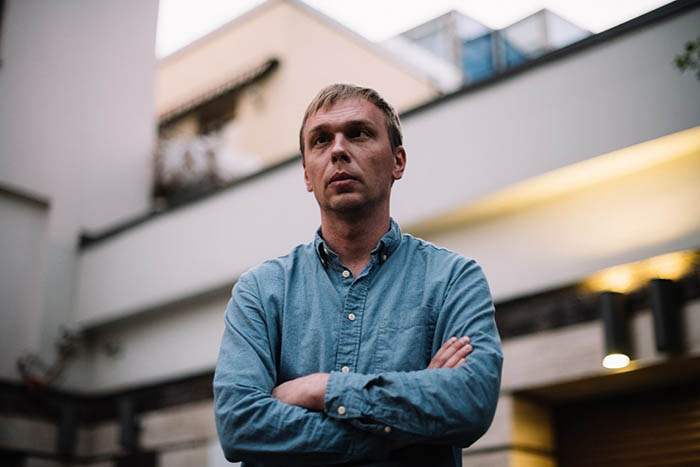
Russia must investigate cases of trumped-up charges against journalists such as Ivan Golunov
Russia must refrain from finalising the legislative changes that would extend the scope of “foreign agent” to individual journalists. Existing problematic legislation already requires media outlets that receive funds from abroad to register as foreign agents. At the time of writing the Duma has approved changes that would extend this to individual journalists, including freelance journalists and bloggers. Any one of these receiving payments for services, or a salary from abroad, would need to register with the ministry of justice. All published work would need to display a “foreign agent” label. This legislation should not proceed, and existing legislation that labels media outlets as foreign agents should be reviewed.
Access to court proceedings is a frequent problem for journalists. As stated in Opinion No. 8 of the Consultative Council of European Prosecutors: “Transparency in the performance of the prosecutor’s duties is an essential component of the rule of law, and one of the important guarantees of a fair trial. Not only must justice be done, but it must also be seen to be done. In order for this to be possible, the media should be able to provide information on judicial, criminal or other proceedings” (paragraph 30). The authorities must review existing processes for compliance with international standards.
The authorities must thoroughly investigate cases of trumped-up charges against journalists and ensure that the instigators are brought to justice. Recent incidents include the high-profile case of Ivan Golunov, arrested for possession and trafficking of drugs, and what appears to be a fake letter sent in the name of Nikita Telizhenko with the aim of discrediting him.
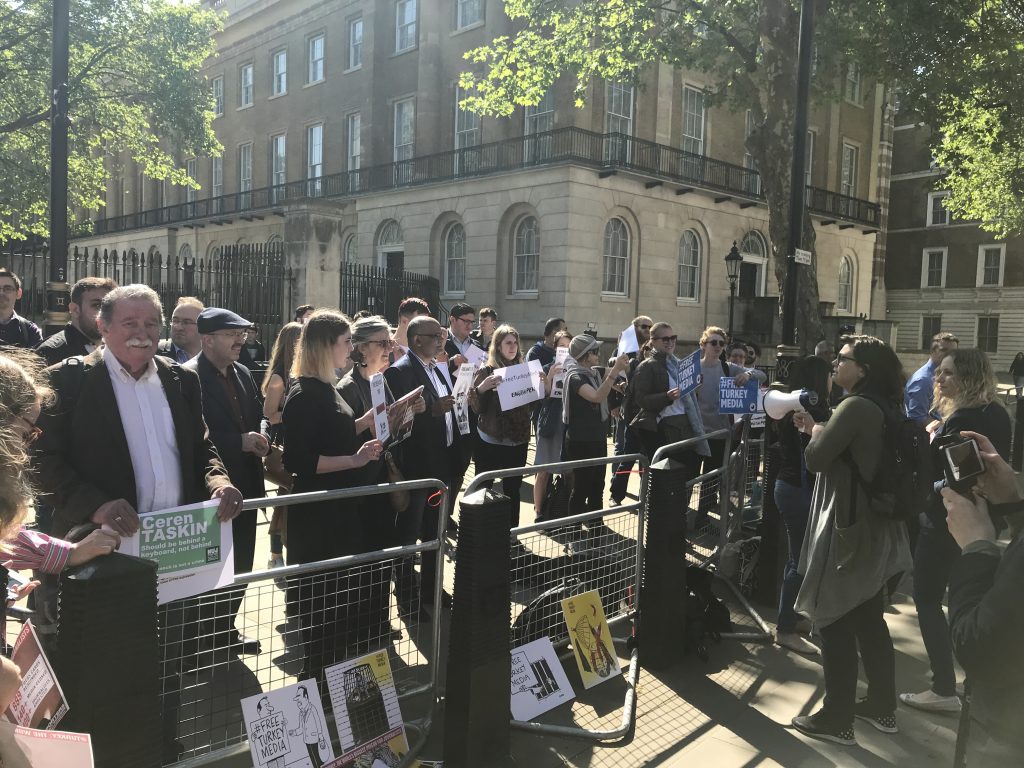
Index on Censorship magazine editor Rachael Jolley leads chants in support of Turkey’s jailed journalists ahead of Turkish President Erdogan’s visit to Downing Street in May 2018
The judicial reform strategy (JRS), launched in May, 2019, will not achieve any meaningful change, at least not in its current form. Turkey’s judicial system is not independent: it is overloaded with cases, many which concern journalists, and it has been undermined through the large-scale dismissal of judges. It is extremely important that other countries and international organisations scrutinise the judicial reform strategy, and make it clear that in its current form it is completely inadequate when it comes to addressing the enormous structural problems of the judiciary.
In May 2019, the United Nations special rapporteur on the promotion and protection of the right to freedom of opinion and expression published a follow-up report to an earlier visit to Turkey in 2016. The rapporteur had made a series of recommendations in 2016, which included releasing jailed journalists and reversing the closure of media outlets. The follow-up report found that Turkey had either failed to implement or had contravened all the recommendations, with the exception of one (lifting the state of emergency). Turkey should urgently implement all the recommendations made by the United Nations special rapporteur.
Diplomatic representations and international organisations, including the EU, need to support observation of trials that involve journalists and media outlets. High-profile trials in central locations can be well-attended by observers, but coverage of trials in remote locations is more limited. Support can include sending representatives to follow trials and/or financial support for organisations that monitor trials.
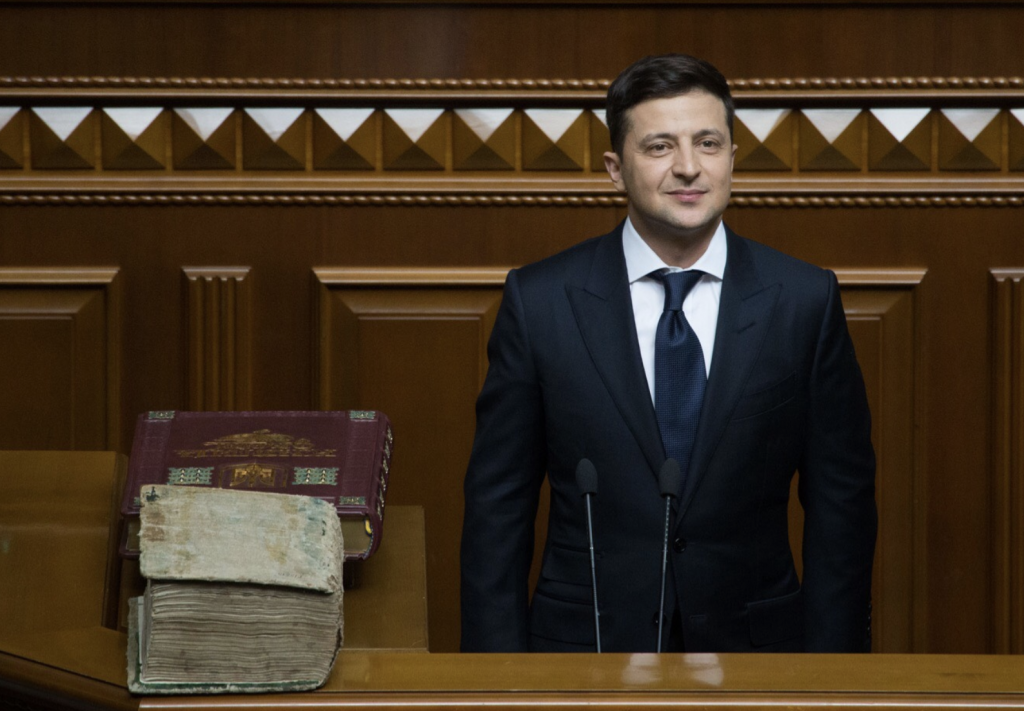
Ukraine President Volodymyr Zelenskiy must engage with the media. Photo: Wikimedia
The government needs to undertake an independent and transparent review of state support, including financial support for far-right groups associated with extremism. The review should involve international experts. It should include investigating the possibility of state security force collusion with paramilitary and extremist organisations and thorough investigations of alleged involvement in violence against journalists, such as the unsolved murder of Oles Buzina.
President Volodymyr Zelenskiy reportedly held a 14-hour press conference in October, attended by 300 journalists. Whether it signals a new era in the relationship between Ukraine’s elected representatives and the media remains to be seen. The failure of the president and lawmakers to engage meaningfully with the media in the past has been a challenge for journalists and this needs to change.
In the highly divisive media landscape, the role of the public broadcaster is extremely important. Ukraine’s public broadcasting company is severely underfunded and currently has a very small audience. As Index on Censorship outlined in its Demonising the Media report a year ago, a significant but underreported trend in the region is the threat to public broadcasters. A number of national broadcasters in the EU and neighbouring countries were brought under closer government control in 2014-18. Ensuring both sufficient funding and editorial independence are crucial in ensuring the public’s right to know is defended.
[vc_row][vc_column][vc_single_image image=”107775″ img_size=”full” add_caption=”yes”][vc_column_text]This article is part of Index on Censorship partner Global Journalist’s Project Exile series, which has published interviews with exiled journalists from around the world.[/vc_column_text][vc_column_text]
Fatima Tlisova didn’t make it easy for the Russian government to get rid of her.
As a reporter covering Russia’s fight against Chechen separatists in what was known as the Second Chechen war in the early 2000s, she was kidnapped, beaten and had her fingertips burned with cigarettes by Russian security forces. A colleague at the independent newspaper Novaya Gazeta who also wrote critically of the Chechen war, Anna Politkovskaya, was murdered in 2006. When she later worked as a correspondent for the Associated Press, pro-government media labeled her a traitor and a CIA agent.
Tlisova was threatened again and again, and still she stayed, reporting from both Chechnya as well as the other small Caucasus republics where separatists fought against Russian rule. Finally in 2007, just months after Politkovskaya’s murder and with threats mounting against not just her but also her family, she decided to flee.
Tlisova went first to Turkey. Then, after being granted political asylum in the U.S., was resettled in Erie, Penn. and worked at a plastics factory for $6.25 per hour. With the help of the Committee to Protect Journalists, she won a Nieman Foundation fellowship to study at Harvard University and was able to relaunch her career in journalism. In 2015, she was invited to the White House to meet then-president Barack Obama in honor of World Press Freedom Day.
Born and raised in a small town in the republic of Karachay-Cherkessia, east of the Black Sea resort of Sochi, Tlisova now lives in Washington, D.C. and works for the Russian-language service of the Voice of America. Her two children, now in their mid-twenties, live in the U.S. as well. Tlisova, 52, who also uses the last name Tlis, spoke with Global Journalist’s Connor O’Halloran about the extensive efforts by President Vladimir Putin’s government to silence her, and her rocky transition to life in the U.S. Below, an edited version of their interview:
[/vc_column_text][/vc_column][/vc_row][vc_row][vc_column][vc_single_image image=”107773″ img_size=”full”][vc_column_text]
Global Journalist: Tell us about the first time you got into trouble with Russian authorities.
Fatima Tlisova: The first issue happened in 2001 when I started reporting on the war in Chechnya and the so-called ‘special operation’ the Russian military was conducting all around the Caucasus. Some of my reports, most of them actually, did not please the authorities.
I reported about the behavior of the Russian commanders…and I witnessed their behavior towards Chechen girls and the local people. And I wrote an article about that. So I was punished, and by punishment, I mean that it was physical. Two large men, unknown to me, ambushed me next to my house and they physically attacked me…I suffered more than one broken rib…
At the end, they said, “Nothing personal. You know what you are punished for.”
After that there were many different situations when I was arrested, kidnapped. This escalated [when I went to work for] AP because at the time, foreign reporters had to obtain multiple licenses and permissions to get to the Caucasus – and I was reporting directly from the Caucasus. Most of the time, the reports I provided were absolutely exclusive because no other factual, reliable, eyewitness journalism was coming from the Caucasus – especially to the Western audience in English.
So suddenly the government media started publishing and broadcasting reports calling me a CIA agent, calling me a traitor to Russia because I was working for the AP…what they saw as American media.
GJ: How many times were you detained?
Tlisova: Almost weekly. Anytime I was assigned to go some place and to send reports. In Russia, especially in the Caucuses at the time, there were military installations called ‘block posts’: military or police or combined, at every entrance road to every single city or town. Imagine you have to drive to several villages or even cross borders between republics.
That means that at every single block post, you are going to be stopped, you’re going to be pulled in. Your body’s going to be searched, your possessions searched. Every single time they were waiting for some command from above before they would release me. Sometimes it lasted for an hour, sometimes for a day.
GJ: Tell us about your kidnapping in 2005.
Tlisova: The kidnapping happened when I was trying to help two German colleagues from Moscow to write about a local insurgency in Nalchik, Kabardindino-Balkariya [200 km west of Grozny, Chechnya].
I had a meeting with them scheduled that day and I decided to stop by my bank to withdraw some cash. At the exit of the bank, there was a car. At that time, I’d been under 24/7 surveillance for months – and I could even identify cars that belong to different [security] departments. All of them were following me in different vehicles.
This time, it was an FSB [Russian internal security service] vehicle. They usually have tinted windows, absolutely dark. They cut me off and the door opened. A voice said, “If you want to see your children again, get in.”
My kids, I knew they were at school. I had no ability to check on them so I just went into the car. They took me outside the city. There was this forest that was not very populated…not many people walking around.
They kept me there for the entire day. They were very angry. One of them said: “You don’t know, but two very good guys were fired today from the FSB. Do you know how much they had to pay in bribes to get those positions? Now they lost everything. Who’s going to feed their families?”
And that continued with insults, with beatings, with [them] burning cigarettes on my skin for an entire day.
Apparently, they’d been waiting for some kind of command about what to do with me next. Later on, I learned that somebody inside the FSB alerted a friend who was a very influential businessman. His name was Stanislav…he interfered and a source [later] told me that he had to pay the FSB for my release.
The next morning I was all covered in bruises and burns.
GJ: So it was after that you finally took the decision to leave?
Tlisova: It wasn’t exactly that moment. But almost a year later. These arrests continued.
When your friends read some nasty stuff about you in the local newspapers or government newspapers, the first time they call you, they laugh. But when they read it three or four times, you notice that when you see a longtime friend on the street, they just can’t look you in the eye. He or she just crosses the street and pretends they can’t see you.
And then sometime later they’ll call you from a public phone and tell you: “Please don’t think bad about me. If I just exchange two words with you, I’m going to be called in by the FSB and questioned.”
That explanation was actually good enough for me to stop contacting even close friends.
I understood that the entire [government media] campaign was not only to punish me and not only to scare me from doing my duties as a journalist, but also to discredit and isolate me. It was a combination of different methods to silence a journalist.
GJ: So when did you finally decide to leave?
Tlisova: I never wanted to leave. I love my work, I was very successful as a journalist. I felt that journalism was my calling and my mission. But at a certain point, I realized that this wasn’t about me anymore. It was about my family.
In 2006, a group of 15 masked men raided my parents’ house who lived 200 miles away from me [in Karachay-Cherkessia]. They searched the house, turned it upside down. My father kept asking: “What’s going on? What are you looking for?”
When they finished, they told him, “Thank your daughter.”
I was prohibited from ever entering government buildings, but suddenly in 2006 I received this phone call inviting me to meet with the head of the presidential administration of Kabardino-Balkraira [a small Russian republic in the North Caucasus]. I knew the man before he joined the government and I knew he was a good man, so I decided I should go.
That man actually started shouting at me as soon as I opened the door. He said: “What do you think of yourself? Disgracing our republic before the entire world? What kind of articles are you writing? What kind of reports?”
At the same time, he was frantically writing something on a piece of paper. And then he showed it to me.
It said: “Please leave. They’re going to kill you.”
He saw that I read the comment and he kept shouting. And then he started tearing that piece of paper apart into very microscopic pieces. He didn’t even dare to trash it. He very carefully collected the pieces from his table and put them in his pocket.
This wasn’t the only warning. There were a lot of warnings, but some of them I totally dismissed.
There were two instances that I thought were genuine, sincere and clear. One of them was the minister.
The other guy was my former classmate, who became head of one of the FSB departments. Once, like they always do, a car cut me off on the sidewalk. It stopped and he jumped out and said, “Don’t worry, it’s me.”
We greeted each other, and then he said, “I know you’re going to think they sent me to scare you, to frighten you. Trust me, I’m coming at my own risk. I know if this gets out I can lose my job.”
He said, “But just so you know, we have lists. You are on those lists. Those lists never expire.”
I didn’t ask any questions, and then he looked at me and he added, “Your friend Anna Politkovskaya, she was on the list. So we are clear what kind of list I’m talking about.”
The thought came to my mind, I mean, it’s horrible if they kill me when I’m alone. But what if they do something when I’m with my kids? That is something I cannot allow or forgive myself for. That’s when I decided to leave.
GJ: How did you finally get out?
Tlisova: I had to first go to Turkey. All I could bring with me was 25 kilograms of personal possessions. My entire life, everything had to be left behind. Of course, they took my computer. I lost my entire archive.
GJ: What happened when you got to the U.S.?
Tlisova: I see there’s a lot of talk about refugees…about how much money they take from U.S. taxpayers. Trust me, when you have to abandon everything and come here and start from zero, you cannot rent a house or a car. You can’t apply for a credit card. You have nothing!
So you just start from zero. I worked at a factory for $6.25 an hour. The plastic factory was producing plastic bottles for water and drinks. All of the refugees who came to that institution [in Erie, Penn.] worked at that factory.
GJ: How did you get back to journalism?
Tlisova: I wrote a proposal for a Harvard fellowship. It was in Russian because my knowledge of English was zero at the time. It was 2007. So I wrote the proposal in Russian. The Committee to Protect Journalists, they found somebody in New York who translated that proposal overnight…15 pages into English. Then someone in Boston took that proposal physically, in person, to Harvard.
I started screaming when I opened the letter from Harvard University. It said: “It is my pleasure to inform you that you have been accepted for a fellowship at Harvard University.”
My kids got scared, they ran to me. I said, “Harvard! We’re going to Boston!”
[/vc_column_text][/vc_column][/vc_row][vc_row][vc_column width=”1/2″][vc_video link=”https://youtu.be/6BIZ7b0m-08″][/vc_column][vc_column width=”1/2″][vc_column_text]Index on Censorship partner Global Journalist is a website that features global press freedom and international news stories as well as a weekly radio program that airs on KBIA, mid-Missouri’s NPR affiliate, and partner stations in six other states. The website and radio show are produced jointly by professional staff and student journalists at the University of Missouri’s School of Journalism, the oldest school of journalism in the United States. [/vc_column_text][/vc_column][/vc_row][vc_row][vc_column][vc_custom_heading text=”Don’t lose your voice. Stay informed.” use_theme_fonts=”yes”][vc_separator color=”black”][vc_row_inner][vc_column_inner width=”1/2″][vc_column_text]Index on Censorship is a nonprofit that campaigns for and defends free expression worldwide. We publish work by censored writers and artists, promote debate, and monitor threats to free speech. We believe that everyone should be free to express themselves without fear of harm or persecution – no matter what their views.
Join our mailing list (or follow us on Twitter or Facebook). We’ll send you our weekly newsletter, our monthly events update and periodic updates about our activities defending free speech. We won’t share, sell or transfer your personal information to anyone outside Index.[/vc_column_text][/vc_column_inner][vc_column_inner width=”1/2″][gravityform id=”20″ title=”false” description=”false” ajax=”false”][/vc_column_inner][/vc_row_inner][/vc_column][/vc_row][vc_row full_width=”stretch_row_content”][vc_column][three_column_post title=”Global Journalist / Project Exile” full_width_heading=”true” category_id=”22142″][/vc_column][/vc_row]